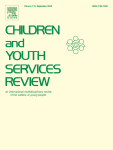Highlights
We study the risk of victimization between South Korean and multicultural family adolescents.•
North Korean and other multicultural family adolescents face a high risk of violent victimization.•
Adolescents who are depressed are more likely to be victimized.•
Deviant lifestyles are associated with student victimization.
Abstract
The objective of this study was to apply Target Congruence Theory (TCT) to explore the relationship between ethnicity and victimization in the context of South Korea. Specifically, this study used more than 235,000 students from the Korean Youth Risk Behavior Web-Based Survey (KYRBS) to explore the victimization experiences of multicultural children through the lenses of target vulnerability, target gratifiablity, and target antagonism. Results from multivariate modeling show that indicators of target congruence and deviant lifestyles were associated with the risk of violent victimization. Consistent with propositions of TCT, students from North Korean families were over eleven times more likely to report that they had experienced serious victimization, even after controlling for opportunity-related variables than students from South Korean families. Similarly, “other” multicultural family adolescents were over five times more likely to report a violent victimization experience than South Korean family adolescents. Policy implications are discussed.
Jaeyong Choi, Ph.D. is an Assistant Professor in the Department of Security Studies and Criminal Justice at Angelo State University. His research interests include criminological theory, police legitimacy, media, and criminal justice, and fear of crime.
Nathan E. Kruis, Ph.D. is an Assistant Professor in the Department of Criminal Justice at Pennsylvania State University—Altoona. His research interests include criminological theory, corrections, desistance from crime, stigma of offenders, drug policy, substance abuse, and treatment.
Julak Lee, Ph.D., is a Professor in the Department of Industrial Security at Chung-Ang University. His research interests lie in the area of security management, comparative criminal justice, and policing.

